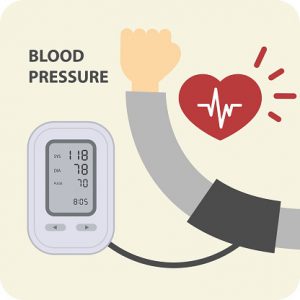 High blood pressure or hypertension is considered “the silent killer.” There are several reasons why it is referred to as such.
High blood pressure or hypertension is considered “the silent killer.” There are several reasons why it is referred to as such.
Most people with high blood pressure actually feel normal; however, if the disease goes undetected and is left untreated, it can lead to heart attack or stroke. In the United States today, heart attack and stroke are leading causes of death.
It is important to get your family, friends, and even yourself checked. You can visit your doctor or check at home.
It can be easy to measure blood pressure at home- here’s how:
- Purchase an automatic, cuff-style, upper-arm monitor. Automatic machines usually cost from $20-$40, and are available at many pharmacies or online.
- Get ready to measure! Do not smoke, drink any caffeinated drinks, or exercise 30 minutes prior to measuring.
- Sit with your back supported, feet flat on the floor, and legs uncrossed.
- Place the cuff onto your arm. This arm should be resting at the level of your heart or just below the chest. The cuff should be above the elbow.
- Push the button to begin measurement. Relax, breathe, and do not talk during measurement.
- Blood pressures are measured as two numbers: a top number (systolic) and a bottom number (diastolic). Write down both numbers, the time of day you measured, and the date(“141/88, 7:00 PM, 11/13/2017” )
- Repeat measurement after 1 minute. Write this number down also. Keep a blood pressure diary with all your measurements.
According to the recently updated high blood pressure guidelines of the American College of Cardiology (ACC), a blood pressure less than 120/80 is normal. Numbers above this measurement are considered elevated and are cause for concern. The ACC has provided the following categories to further define blood pressure measurements and levels:
- Elevated: Systolic between 120-129 and diastolic less than 80
- Stage 1: Systolic between 130-139 or diastolic between 80-89
- Stage 2: Systolic at least 140 or diastolic at least 90 mm Hg
- Hypertensive crisis: Systolic over 180 and/or diastolic over 120
If your results are greater than 130 for the top number or greater than 80 for the bottom number, it is highly recommended that you see your doctor to receive a comprehensive medical examination.
If your blood pressure exceeds 180/120, the American College of Cardiology advises that you seek medical attention immediately, as this is critical.
Checking your blood pressure is important for heart health. There are also lifestyle changes that you can apply to your daily life to help you manage blood pressure levels and your health. Lifestyle changes can include maintaining a healthy weight by eating a well- balanced diet, exercising regularly, reducing sodium intake, limiting the amount of alcohol you consume and quitting smoking.
To schedule an appointment with the Family Medicine Department at Jamaica Hospital Medical Center, please call, 718-206-6942.
All content of this newsletter is intended for general information purposes only and is not intended or implied to be a substitute for professional medical advice, diagnosis or treatment. Please consult a medical professional before adopting any of the suggestions on this page. You must never disregard professional medical advice or delay seeking medical treatment based upon any content of this newsletter. PROMPTLY CONSULT YOUR PHYSICIAN OR CALL 911 IF YOU BELIEVE YOU HAVE A MEDICAL EMERGENCY.

